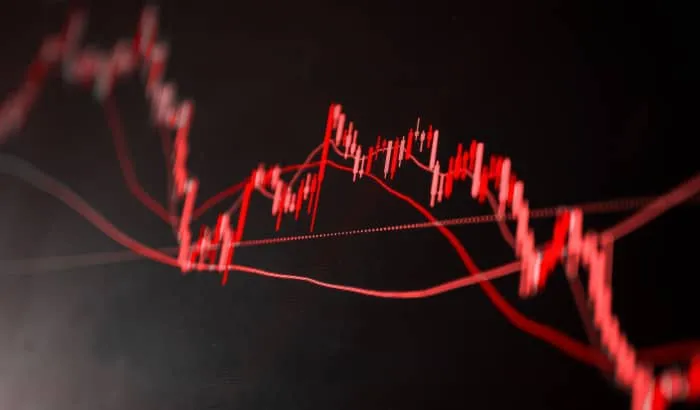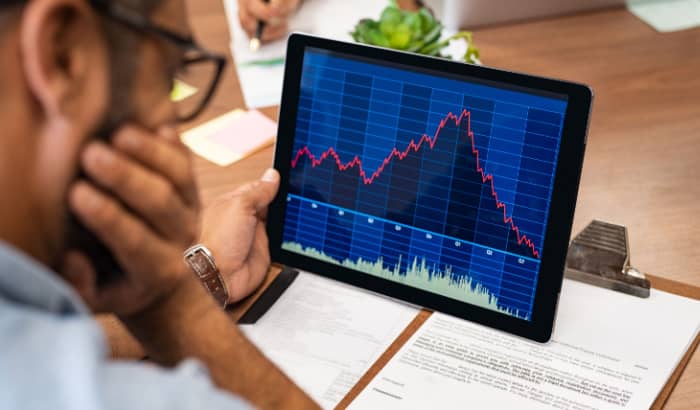Wednesday Nov 22 2023 10:53

10 min

Stock markets are an intricate web of opportunities and risks. While they offer the potential for substantial gains, they are not without their pitfalls, as history has repeatedly shown us.
From the Wall Street Crash of 1929 to the Global Financial Crisis of 2008, stock market downturns have had profound impacts, not just on investors but on economies at large.
Understanding these historical episodes is not merely an academic exercise; it is a crucial endeavour for any serious investor seeking to mitigate risks and navigate the complexities of today's financial landscape.
In this article, we will learn five essential lessons that can be drawn from past stock market crashes, providing you with actionable insights to enhance your investment strategy.
A stock market crash refers to a sudden and significant decline in the value of a broad range of stocks in the financial markets, leading to a substantial loss of paper wealth.
This decline is much more drastic than a typical market downturn and often occurs in a very short period of time—sometimes within a single trading day or over a few days.
The causes of a stock market crash can be manifold, including economic indicators, investor sentiment, political instability, and major financial disruptions.
Stock market crashes can have a devastating effect not only on investors but also on the economy as a whole.
Financial institutions and policymakers often try to prevent or mitigate the effects of a stock market crash through monetary policy, regulation, and other interventions.
However, the complex interplay of factors contributing to a crash often makes it difficult to predict and prevent.
Each of these crashes outlined below had unique characteristics but generally resulted in periods of economic uncertainty and often had long-lasting impacts on investment strategies, regulation, and investor behaviour.
This crash took place in late October 1929 and is considered the worst stock market crash in the history of the United States. Over the course of several days, the Dow Jones Industrial Average dropped significantly. This event triggered the Great Depression, a period of severe economic downturn that lasted throughout the 1930s and had global repercussions.
Black Monday refers to October 19, 1987, when the stock markets crashed worldwide, shedding a huge value in a very short time. The Dow Jones lost 22.6% of its value in a single day. The reasons for the crash are numerous but include programme trading, overvaluation, illiquidity, and market psychology.
The late 1990s saw a surge in the shares of tech companies, fuelled by the rise of the Internet and speculative investments. However, by 2000, it became apparent that many of these tech companies were not profitable. The bubble burst led to a significant downturn in the NASDAQ index, affecting the wider stock market as well.
Triggered by the U.S. subprime mortgage crisis, this crisis led to severe instability and declines in global stock markets. Major financial institutions collapsed, and governments worldwide had to intervene to rescue beleaguered institutions. The crisis led to a severe global recession, affecting jobs, savings, and investments.
On May 6, 2010, global financial markets suffered a brief but severe crash, only to recover minutes later. The Dow Jones temporarily lost more than 1,000 points, and an estimated $1 trillion in market value was wiped out, before a partial rebound. Algorithmic trading and high-frequency trading were cited as contributing factors.
On 23 June 2016, the UK chose to exit the European Union, resulting in notable drops in stock markets around the world. The British pound also fell sharply in value. Market volatility continued for some time due to uncertainty regarding the terms of the UK's exit.
Triggered by the global COVID-19 pandemic, markets around the world plummeted in February and March 2020 due to the economic uncertainty created by the virus. Emergency measures, including interest rate cuts and economic stimulus packages, were implemented globally to try to mitigate the economic impact.

The history of the financial markets is punctuated by a series of significant stock market crashes, each unique but all devastating in their immediate impact.
By examining the underlying causes and consequences of these crashes, we can glean insights that help us navigate the complexities of investing and hopefully mitigate risks.
Here are five important lessons that can be gleaned from past stock market crashes:
One of the core lessons from events like the dot-com bubble is the importance of diversifying your investment portfolio. Investors who were heavily invested in technology stocks suffered significant losses when the bubble burst.
Diversification involves allocating your investments among different types of assets like stocks, bonds, and commodities in order to minimise risk.
The herd mentality often exacerbates stock market crashes. For instance, Black Monday in 1987 was partly fuelled by panic selling, which was significantly magnified by the use of program trading systems that executed large sell orders automatically.
Being aware of market psychology can help you avoid making impulsive decisions. When everyone is buying, exercise caution, and when everyone is selling, look for opportunities—buy low and sell high.
The 2008 Global Financial Crisis taught us the importance of strong economic fundamentals. Many financial institutions and investors had engaged in risky behaviour, thinking that property prices would keep rising indefinitely.
The use of borrowed money to invest, known as leverage, can magnify both gains and losses. This was evident in the Asian Financial Crisis where excessive borrowing in foreign currencies led to defaults when currencies devalued.
While leverage can amplify returns, it also increases the risk of significant losses. Always be cautious when using leverage, and make sure you understand the risks involved.
The lack of adequate regulation often plays a role in financial crises. For example, the lack of oversight in the mortgage lending market contributed to the 2008 financial crisis.
The cornerstone of such preparation is diversification. While diversification can't eliminate risk entirely, it can offer a level of protection.
Strong and financially robust companies or assets are more likely to weather the storm during market downturns.
Another important strategy is to maintain a long-term perspective. Market volatility is less impactful over a longer investment horizon, and historically, markets have recovered from crashes.
Hence, try not to make impulsive decisions based on short-term market movements. Maintaining an emergency cash reserve is also a prudent move.
Ultimately, regular monitoring and periodic rebalancing of your portfolio, perhaps with the guidance of a financial advisor, can go a long way in safeguarding your investments against the detrimental effects of a stock market crash.
Follow up on this related article: 5 most common trading mistakes to avoid
Stock market crashes are complex events often triggered by a mix of factors that may include economic indicators, market speculation, and financial instability.
Negative economic data like high unemployment rates or inflation can dent investor confidence, leading to a market downturn.
Similarly, overvaluation and speculation can create asset bubbles, the bursting of which can precipitate a crash.
Political shifts and global events like natural disasters or terrorist attacks add another layer of complexity, as they can introduce uncertainty and volatility into the financial markets.
Technological factors, such as high-frequency trading algorithms, have also been known to exacerbate market conditions, as seen in the Flash Crash of 2010.
Herd behaviour, or panic selling, is another psychological element that can rapidly amplify declines in market value.
After the Wall Street Crash of 1929, the United States introduced a series of reforms, like the Securities Act of 1933 and the Securities Exchange Act of 1934.
These acts set the foundation for contemporary securities oversight, mandating that companies reveal their financial data and forming the Securities and Exchange Commission (SEC) to supervise and regulate the stock market.
The 1987 Black Monday crash led to the introduction of market-wide "circuit breakers" in the U.S., which temporarily halted trading during extreme volatility to prevent panic selling.
The 1997 Asian Financial Crisis led to reforms in the International Monetary Fund (IMF) and the World Bank, as well as banking regulations within the affected countries.
After the 2008 Global Financial Crisis, regulations tightened significantly around the world.
In the U.S. The Dodd-Frank Wall Street Reform and Consumer Protection Act was enacted in 2010, aiming to reduce risks in the financial system, including the oversight of hedge funds, derivatives, and mortgage lending.
Understanding the anatomy of past stock market crashes serves as more than just a history lesson; it provides essential insights for navigating the complex world of investing.
The five lessons outlined in this article, offer investors a guidebook for both risk mitigation and opportunity recognition.
If you're keen to put these lessons into practice, consider diving into the world of trading.
Whether you're a seasoned trader or a novice looking to get started, there's no better time than now to refine your strategy and possibly turn challenges into opportunities.
Ready to trade with markets.com? Creating an account is easy.
"When considering "CFDs" for trading and price predictions, remember that trading CFDs involves a significant degree of risk and could result in capital loss. Past performance is not indicative of any future results. This information is provided for informative purposes only and should not be considered investment advice."